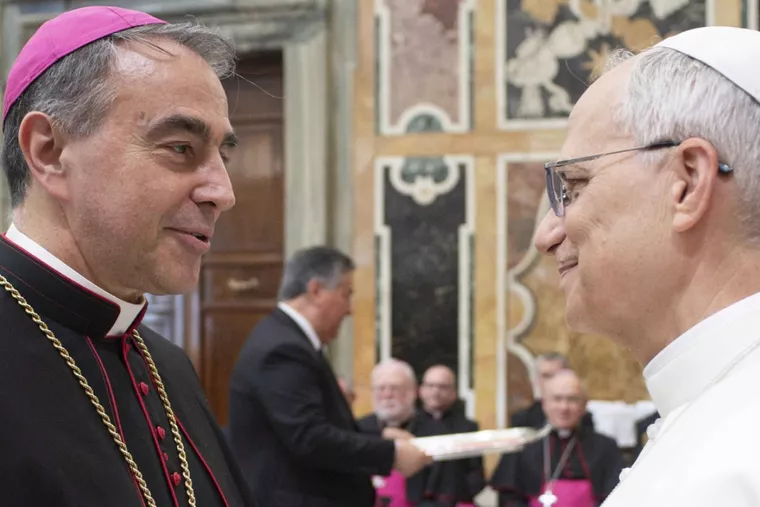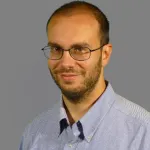
Italian prelate discusses the moral and ethical issues surrounding artificial intelligence, outer space and world peace.
SIGN UP FOR OUR NEWSLETTER HERE
The United Nations’ General Assembly, the U.N.’s main deliberative body, starts its 80th session in New York on Tuesday, Sept. 9.
Among those who will closely follow the session’s deliberations on Palestinian statehood, the wars in Gaza and Ukraine, climate change and other global issues is Archbishop Ettore Balestrero, the Holy See’s permanent observer to the United Nations and other specialized institutions in Geneva, as well as the World Trade Organization.
In a recent interview with EWTN News, the Italian prelate discusses the moral and ethical issues surrounding artificial intelligence, outer space and world peace.
Leo XIV immediately drew attention, with the choice of his papal name, to the theme of the social doctrine of the Church. From your vantage point in Geneva, how important is social doctrine and its development in the world?
The social doctrine of the Church contributes to ensuring that what is just can be effectively recognized and then also realized. For this to happen, the demands of justice must be placed before personal interests, or those of a social category, or even those of a state. A vast space opens up for the Church here: It helps to root, nourish and strengthen in consciences the energies necessary for all this to be realized.
What is the impact of social doctrine at the United Nations?
In Geneva, social doctrine interests even those who do not share the same beliefs. In a changing world where tensions and conflicts are growing, many questions about the meaning of life, the dignity of the person, and the principles and limits of social coexistence become more dramatic and pressing. The answers, unfortunately, when they exist, are often selfish and unconvincing. For this reason, the Church, and first and foremost the papacy, is looked to as the most authoritative, credible and compassionate ethical body. There is a need to confront and receive enlightenment from the social doctrine of the Church to safeguard the human person and his future, the good of each and every one, and the environment.
How does the Holy See work on this interest?
The world’s interest requires us to apply the principles of this doctrine to the present. In this spirit, we are about to publish a study on the ethical principles that should guide the activities of the international community in outer space, which is of great topicality today, also in light of its growing economic, military and strategic importance. The publication is the result of years of consultation with various experts in the field of disarmament and international law. It invites us to consider space as a res communis (“a common thing”), to be explored with a sense of shared responsibility and oriented towards the common good, also for the benefit of future generations. Given that our daily life is increasingly influenced by satellites (think of the monitoring and prevention of natural disasters, navigation, telecommunications, etc.), it is essential that space does not become a new theater of conflict, but that states and private actors, increasingly protagonists, cooperate and regulate their activities in an equitable manner.
The Pope immediately underlined the connection of his name with the new industrial revolution and the challenges that arise with artificial intelligence and its applications. What are the moments in Geneva in which you have dealt with the theme of artificial intelligence? And what are the consequences in the fields of work, peace, health and ecology, which are among the most important themes that the mission must address?
The topic of AI is the subject of great transversal interest, by almost all of the international organizations in Geneva: the Office of the High Commissioner for Human Rights, the World Health and Labor Organizations, the Conference on Disarmament, and the processes linked to various international conventions. Nor can we forget other important international organizations such as the International Telecommunication Union and the World Trade Organization. Centers of excellence such as CERN [the European Organization for Nuclear Research] and study centers such as the Geneva Science and Diplomacy Anticipator (GESDA) are also involved in the revolution brought about by artificial intelligence and its use for research purposes. Consequently, the Mission of the Holy See in Geneva deals with AI in various contexts and under various profiles: in the field of labor, health, peace and human rights, etc. Last year, we were the first diplomatic mission in Geneva to organize a colloquium on this topic, especially to encourage discussion between the diplomatic world and international organizations, with international experts such as Father [Paolo] Benanti [a top Vatican adviser on AI who is a member of the United Nations’ Advisory Body on Artificial Intelligence.]
Pope Leo spoke about the world of work. What is the situation in that field?
In the world of work, we are experiencing a new revolution, this time “algorithmic.” On the one hand, AI will transform the world, create new tasks and professional figures, automate many processes, increase productivity in specific sectors, and free workers from repetitive or exhausting tasks. On the other hand, many jobs will inevitably become superfluous and be eliminated, and there is a risk that inequalities between countries and people will increase.
What happens, instead, with regard to the commitment to peace?
In the commitment to peace, AI will help identify potential areas of instability and tension, facilitate the monitoring of human-rights violations, and create scenario simulations. On the other hand, it could also facilitate and disseminate disinformation, presenting a partial and ideological vision of reality and problems, depending on the data archives it processes at very high speed. Furthermore, there is a debate in the humanitarian field these days on lethal autonomous weapons systems (the so-called “killer robots”) capable of selecting targets and attacking them in a totally autonomous manner, with very serious consequences for human dignity. How can we avoid the decision on the lives of thousands of people being handed over to the autonomous decisions of a military armament that is the result of the algorithms of its AI?
Leo XIV also spoke of attention to fundamental rights. But what are these rights and how should they be promoted?
Fundamental rights are the rights in which human dignity is articulated; they express the dignity of people as children of God. They are rights that are valid everywhere, always and for everyone and must be promoted at all levels, individual, community and institutional, but also in every area, cultural, legal, social and economic and religious. To promote them, it is not enough to proclaim them: It is necessary to guarantee them, defend them, make them effective — and sanction those who do not respect them. Slogans and promises are not needed, but rather awareness and concreteness, determination and freedom from interests and ideologies that mortify man rather than make him free.
What are the challenges that the multilateral world is facing?
The fragmentation of the international community into so-called “like-minded groups,” the conflict and lack of dialogue that the world suffers from today have also found a home in all these fields. The tools and organizations that should protect and promote human rights are often bearers of a false anthropology, which seeks to impose a reductive and ideologized vision of the person, rather than responding to the real needs of the populations of the Earth.
Leo XIV immediately made a strong appeal for peace. How does the Holy See work for peace? And what is the task of its mission in this sense?
Christ is peace, therefore the promotion and defense of peace — in hearts, in society and in the world — are at the center of the action of the Church and the Holy See. Pope Leo recalled this [earlier this year] in his first meeting with the diplomatic corps accredited to the Holy See. The mission in Geneva deals with this at a diplomatic level, participating in the work of the almost 40 international agencies based in Geneva, of which the Holy See is a member or observer. As the Pope emphasized to the ambassadors, a negative conception of peace is not enough.
How, then, can we give strength to the idea of peace?
Committing to the reception, protection and integration of migrants and refugees means honoring Christ, in whose likeness they were created, but also respecting their dignity and defending peace and stability. Promoting a fair and equitable trade system means working for peace between countries. Defending and promoting respect for international humanitarian law and calling for respect for disarmament treaties is equivalent to adding a small stone to the edifice of world peace, so that it is truly “disarmed and disarming,” as Pope Leo XIV hoped. Promoting the logic of encounter between peoples and within populations, defending the lives of the unborn and the elderly, is telling the truth about humanity, combating the logic of waste, protecting the weakest, and promoting social peace. To support the right to development and defend the environment, it is necessary to fight poverty and injustice, promoting human dignity and defusing some of the deadliest factors of today’s conflicts.
This article was originally published on NCRegister.

Andrea Gagliarducci is an Italian journalist for Catholic News Agency and Vatican analyst for ACI Stampa. He is a contributor to the National Catholic Register.








